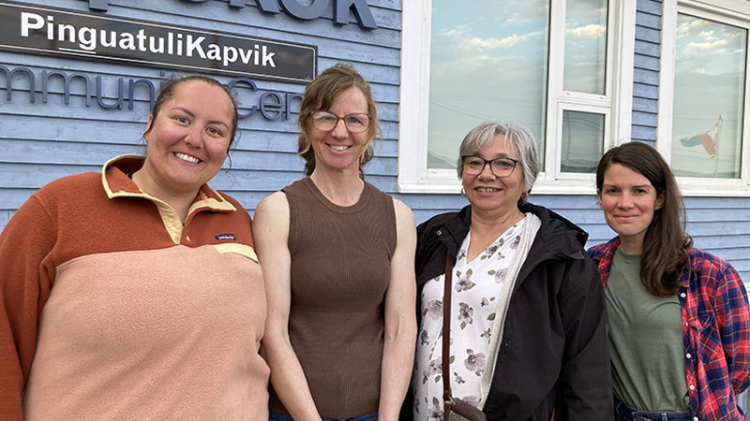A UNB researcher is leading Canada's efforts to study toxic marine phytoplankton in the Arctic, which could pose a serious health risk to Northern, and especially Inuit, communities. These types of toxins can contaminate sea life, cause poisoning with no known cure, and threaten food security and traditional diets. Beyond understanding the issue, the project's team will work to co-design monitoring and early warning systems with and for local communities.
Dr. Audrey Limoges, associate professor of earth sciences at the University of New Brunswick (UNB), will lead Canadian scientific efforts for PHATE, a Danish-led, multinational project that will explore the growing risk of marine phycotoxins in the Arctic. The Canadian portion of the PHATE project has been awarded $4 million over four years through a joint NordForsk-New Frontiers in Research Fund (NFRF) opportunity.

Photo caption: From left to right: Michelle Saunders (project co-lead, Nunatsiavut Government), Samantha Pilgrim (Nunatsiavut Government, leading monitoring efforts in Postville), Carla Pamak (Nunatsiavut Government) and Dr. Audrey Limoges, in front of the community centre in Postville where consultations were held at the end of July.
Phycotoxins are poisonous or toxic substances produced by algae; in this case, they are released by harmful algae. A similar phenomenon occurs with the blue-green algae (cyanobacteria) that has become a growing concern in many waterways. In the oceans, the algae tend to be either microalgae known as diatoms, or dinoflagellates.
While climate change affects the entire globe, warming effects are particularly prevalent near the poles; in the Arctic, for instance, temperatures are rising at four times the rate of the annual global average. In addition to melting snow and ice and rising sea levels, increasing water temperatures also create more favourable conditions for harmful algae blooms.
Not only do these toxins have a direct impact on marine life, but they can also accumulate in organisms, increasing in concentration as these organisms are eaten by others progressively higher in the food chain. This concentration of toxins can have serious negative effects for humans who eat contaminated sea life a regular part of the diet in Northern communities.
"This emerging climate-driven risk is particularly important in Inuit coastal communities, which face high prevalence of food insecurity and where traditional harvesting activities and marine food sources are central to diet, nutrition, culture and well-being," said Limoges.
"Depending on the severity of the toxin exposure, symptoms from consuming affected food can range from a tingling sensation and numbness starting at the lips and mouth and spreading to the face, to vomiting, and in extreme cases, respiratory failure and potentially death. There is no cure for this poisoning, and the toxins are not destroyed by cooking or freezing food, so preventive measures are key."
Given the extensive and relevant local knowledge, and the significant impact on local communities and practices, working with Inuit communities is an important consideration.
"Inuit knowledge and communities are at the heart of this project," said Limoges.
"The project was entirely co-designed and is co-led with northern partners. About one third of the Canadian team is based in Nunatsiavut and Nunavik, and we expect this number to grow as the project unfolds. The tools we're using are tailored for locally-adapted applications. We have already started consultations with local partners and Inuit wildlife boards to help identify priority sites, animal species and tissues for sampling, considering ecological, cultural and nutritional factors. And, finally, the data will be collected and interpreted together, ensuring meaningful engagement and reciprocal learning."
For Limoges, this new funding represents both the start of a new project as well as the latest step in a long-term process. Limoges' research focuses, broadly, on the impact of climate change on ocean conditions, and particularly on how these changes affect algae, which form the basis of marine food webs.
For the past six years, Limoges and her team have travelled to northern Canada, where they've worked to establish relationships with local communities and build the foundation for this project.
"This project is the culmination of years of work by our team members in Inuit Nunangat and about one full year of project co-construction and discussion," she said. "Our team, which includes researchers and students, will continue to travel to the area regularly."
Limoges has also built relationships with collaborators from Denmark and Iceland and is looking forward to expanding those partnerships with other Nordic experts.
Created under the Nordic Council of Ministers, an official body for international cooperation in the Nordic region, NordForsk supports cooperative research activities among members. The Council of Ministers represents the countries of Denmark, Finland, Iceland, Norway and Sweden, as well as the autonomous regions of the Faroe Islands, Greenland and Åland.
PHATE will gather experts and communities from these member countries and from Canada. Reflecting the importance of multiple perspectives and subject areas, this group will work across disciplines in the natural sciences, environmental and public health, archeology, social anthropology, and cultural studies, as well as centering local and Indigenous knowledge and perspectives.
The international PHATE project is led by Dr. Sofia Ribeiro (Geological Survey of Denmark and Greenland). Limoges is the nominated principal investigator for the Canadian project; Michelle Saunders (Nunatsiavut Government; co-lead), Noah Brosseau (Makivvik; co-lead), Liz Pijogge (Nunatsiavut Government), Carla Pamak (Nunatsiavut Government), Dr. Lucy Beaulieu (Université Laval), Dr. Mathieu Ardyna (Université Laval), Dr. Maxime Geoffroy (Memorial University of Newfoundland), Dr. Mélanie Lemire (Université Laval), Dr. Ladd Johnson (Université Laval) and Dr. Erin Bertrand (Dalhousie University) are joining as co-principal investigators.
Collaborators on the team also include representatives from the Government of Canada's Fisheries and Oceans Canada and National Research Council; the Nunatsiavut Government Department of Health and Social Development; the Government of Quebec's Nunavik Regional Board of Health and Social Services; and Anguvigaq.
Together, this multinational, multidisciplinary, Indigenous-settler team will work to create comprehensive risk assessment and adaptation tools that are based on scientific understanding of large-scale oceanic processes and climate change, the ecological connectivity of the region, and the local and cultural contexts of Kalaallit Nunaat (Greenland), Nunatsiavut and Nunavik (Canada), the Faroe Islands and Iceland.
"This program proactively tackles a new socioeconomic and ecological challenge for the Arctic and aims to both produce data and establish a support system for the communities to prepare them for the future. Training is a significant component of this program, and in addition to graduate students, our team will employ Inuit research coordinators and summer students in Nunavik and Nunatsiavut, who could become pivotal figures in their communities."
This diversity of perspectives, experiences and knowledges is essential for this undertaking, and for Limoges, it is one of the project's most exciting and meaningful features.
"Beyond the scientific aspects," she added, "this project is fundamentally built on friendship and human interaction. I feel privileged to work alongside researchers, knowledge holders and professionals who are not only experts in their fields but also open, curious, and inspiring and positive leaders."
And, most importantly, the relationships, the friendships, and the science rooted in Indigenous ways of knowing are being used to collaboratively create a safer, healthier future both for Northern communities and beyond.













